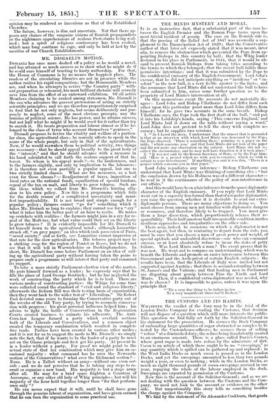MR. DISRAELI'S MOTION.
DISEAE-LI has once more dashed off a policy as he would a novel, and has attained so much success as to show what he might do if he could cure himself of trusting to hasty authorship. For that, the House of Commons is by no means the happiest place. The readers of the circulating libraries are not in presence while the author recites his rapid composition; but the Honourable Members are, and when he attempts to revive "the Country party" with- out preparation or rehearsal, his most brilliant rhetoric will scarcely save him from the effect of an untoward exhibition. Of all active Members claiming to be ranked among statesmen, Mr. Disraeli is the one who advances the gravest pretensions of acting on strictly scientific principles; and we are therefore proportionately surprised to find that he not only neglects, but seems deliberately and pur- posely to neglect, some of the most obvious precepts, nay the truisms of political science. He has power, and he attains success, but not half what he might if he would work for it rather than try to snatch it. He treats preparation and labour almost as if he be- longed to the class of tyros who account themselves "geniuses."
Disraeli proposes to revive the vitality and welfare of a particu- lar class, the agricultural class ; he scarcely affects to speak in the name of the whole people, but only in that of the agriculturists. Now, if he would reawaken them to political activity, two things are necessary—that he should appeal broadly to the great body of the "interest," and that he should advance with a measure in his hand calculated to call forth the zealous support of that in- terest. To whom is his appeal made ?—to the landowners, and to the farmers slightly, and only by implication to the labourers : it is therefore not even partially a popular appeal, but one to two strictly limited classes. What are his measures, as a bait even for those classes ? — Readjustment of taxes, imposition of local rates on the national funds, equalization of special burdens, repeal of the tax on malt, and liberty to grow tobacco. Such are the ideas which we collect from Mr. Disraeli's hinting allu- sion to his own policy. Now this is a programme which fails for the double reason of a complicated uncertainty and mani- fest impracticability. It is not broad and simple enough for a popular policy ; farmers cannot "go for" something which it takes Mr. Disraeli so long to explain; they cannot use for a " cry " what it takes him the better part of an hour to recite. He mixes up crotchets with realities : the farmers might join in a cry for re- peal of the Malt-tax, but what value could they set on the liberty to grow tobacco ? It is evidently impossible for Mr. Disraeli to let himself down to the agricultural mind ; although Lamartine struck off, "on grey paper," an idea which took possession of Paris, " saved society'," and so forth, our Lamartine cannot improvise at that rate for the slow agriculturists. His tobacco project may be a striking coup for the region of Pontet or Reece, but we do not see that it will tell in Warwickshire or Buckinghamshire. In short, Mr. Disraeli has come before Parliament on an idea of call- ing up the agricultural party without having taken the pains to prepare such a programme as will interest that party and command its support.
To take a more strictly Parliament-election view of the matter. He puts himself forward as a leader; he expressly says that he fills the place of Lord George Bentinck ; but he has neglected the work of constructing the party which he is to lead. There are various modes of constructing parties : the Whigs for some time were collected round the standard of "civil and religious liberty," afterwards the Reform Bill was their testing basis of organization, then they went back to the wider test of " Liberalism." Sir Robert Peel devoted some years to forming the Conservative party out of the wrecks of the old Tory party, by trying to reconcile conserva- tion with progress : his great personal influence helped him ; his advice to fight the battle of Conservatism in the Registration Courts created business to animate his adherents. The Anti- Corn-law League formed a party which overlaid sections both of the Liberals and Conservatives, and a common object created the temporary combination which resulted in complete free trade. Parties have been created in various other modes ; and it is not for us to suggest the mode to Mr. Disraeli : we simply note the fact, that if he wants to be the leader of a party he must net on the Glasse principle and first get his party. At present he is a leader without a party. For proof we might point to the actual state of that lax combination which may give him an oc- casional majority : what command has he over the Newcastle section of the Conservatives ? what over the Richmond section ?- None. He is a Talbot without an army—without one even out- side : and we do not perceive that he is taking any steps to re- cruit or organize a new band. His majority is but a stage army after all. He may for a brief space frighten a Countess of Auvergne, or any other old lady of Whig principles ; but will his majority of the hour hold together longer than "for that perform- same only "?
He can never expect that it will, until he shall have gone through the genuine labour of organization, and have given earnest that he can turn the organization to some practical use.


























 Previous page
Previous page